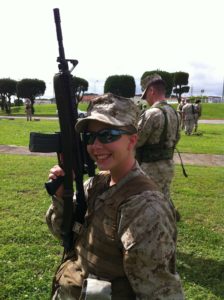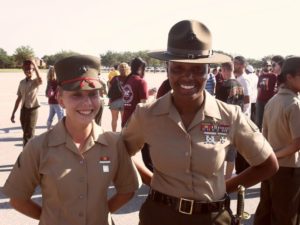WCU is home to a small number of U.S. servicemen and even fewer servicewomen.

Jessica Bradley smiles after a long day of drills, training and physically demanding tasks.
Photo courtesy of Jessica Bradley.
Upon attending the Veteran’s Day candlelight vigil hosted by Last Minute Productions, I met WCU student and veteran of the U.S. Marine Corps, Jessica Bradley. She attended the vigil in honor of current members of the armed forces as well as those she had known who lost their lives in service. Speaking with her and later two other female student servicewomen, I was able to get a better understanding of what these women have experienced, the challenges they have overcome and what their take on women in the military is after living through it.
Bradley began her journey in bootcamp just ten days after graduating high school. Her reason for joining? The challenge. Serving in the administration field, she was stationed in Okinawa, Japan for three of her four years of service.
Students, Carissa Snedden (senior) and Allison Hixson (junior) are in the Student Veteran Association with Bradley. Snedden is a veteran of the U.S. Air force and Hixson is active in the National Guard and in the spring, she will be deployed to Kuwait.
 Bonding these three together is WCU’s Student Veteran Association. The SVA consists of around 30 members with only 5 women. The group meets at Tuck’s every other Tuesday at 6:30 p.m. for drinks, food and trivia. The SVA does more than bring them together, it creates an open environment and a support system where they are surrounded with camaraderie.
Bonding these three together is WCU’s Student Veteran Association. The SVA consists of around 30 members with only 5 women. The group meets at Tuck’s every other Tuesday at 6:30 p.m. for drinks, food and trivia. The SVA does more than bring them together, it creates an open environment and a support system where they are surrounded with camaraderie.
Women have been increasingly enlisting in the military since 2001 and in 2013 the ban on women serving in combat was lifted. More than 214,000 women are currently active in our military with over 118,000 in reserves, yet the cultural expectation of what a veteran looks like has not wavered.
“When you think of veterans, you think of old men with their ballcaps that says ‘retired’, but most people don’t think about women,” said Bradley.
Bradley, Snedden and Hixson were all in agreement that because they are women there is a lack of recognition since they don’t look like what many assume veterans must look like.
“I definitely get less recognition. I have been to restaurants, grocery stores, and have asked if they have a military discount and they always assume it is my boyfriend,” added Bradley.
Among the struggles that women face, gender bias, sexual harassment and assault, mental health and job assignment opportunities rank in the top for personal challenges according to a survey conducted by Service Women’s Action Network.

Carissa Snedden snaps a selfie in her uniform for another full day’s work in the U.S. Air Force.
Photo courtesy of Carissa Snedded
A major obstacle for these women and many other soldiers out there was the transition back to civilian life.
“The main thing about when you get out of the military that people don’t understand is that here is a huge cultural gap,” said Snedden.
They all shared this problem of a cultural difference upon returning home. They explained that you go from a military culture where everyone is a team and no matter what you need people are there for you to the culture of civilian life centered around individuality and independence. Resulting from this culture difference, it can make a person feel isolated and out of place.
“That’s why I’m in sociology and my world revolves around trying to bridge that [cultural] gap,” said Snedden.
As the minority of the military, women are subject to sexism and gender bias just for being a woman. In fact, when asked if women are treated equally to men in the military, Snedden responded with a resounding, “Hell no!”
Snedden recalled a few moments from her time in the Air Force to prove that equality was not exactly the case. Her basic training unit was told they could not shave their legs and that it was a privilege while the men were fully expected and able to shave their facial hair. In addition, if a male soldier were to underperform physically, everyone would just accept that it was an off day for him. However, if it were her or another female underperforming, some would think that is the reason why women don’t belong in the military and that they don’t have what it takes.

Allison Hixson snaps a selfie during some of her down time with the U.S. Air Force.
Photo courtesy of Allison Hixson
An extreme case was a supervisor of Snedden’s that tended to tear down his troops. Several women had been pushed past their limits and broke down crying. Once, the same thing happened to Snedden once the supervisor called her “worthless”, told her she was “deadweight” and said her life was “meaningless”. She reported him to the master sergeant since that was excessive and not motivating. His response?
“Do you need to go to the clinic and get some pills?”
Her supervisor was later addressed… Only after a male soldier came to the offices crying and it finally registered that he was being mentally abusive.
Adding to the mix, Bradley says she has noticed sexism here and there, a lot of times in the small things.
“If a woman does exceptionally well in something physical fitness wise, sometimes, the reaction will be good job, you did great for a female.”
While these instances of gender bias and sexism do occur, many servicewomen are capable of letting it go and not taking it as a personal attack.
“As a whole I usually don’t pay too much attention to that [gender bias] because whenever I’m in uniform I look at all of us as a whole,” said Hixson.

Carissa Snedden (left) and Allison Hixson (right) stand united in front of the clock tower.
Photo by Ashley Kairis
Amongst the most controversial of issues female veterans face are sexual assault, abuse and harassment.
Snedden went through basic training in 2009 while Hixson had hers in 2013. From their experiences, there was a noticeable shift from sexual assault not being spoken about often to having briefs more and more often.
“In basic we were briefed left and right on sexual assault and still in our [maintenance] shop once or twice a year we will have briefings on them where we hear about them, the awareness, and how you can use your chain of command if you feel like you are being sexually assaulted or harassed,” said Hixson. “It’s still always going to be there, it’s just whether you feel like it would be worth putting your job on the line. You could still lose your job and your rank or ruin the other person’s career.”
Reflecting back to the day they each chose to enlist, all three would stand by their decision they made to join the military and each of them encourage any young woman out there who is thinking about enlisting to do so.
“I don’t regret my time, I would do it all over again,” said Bradley.
“I would encourage young women to join, if for no other reason to start turning the tables. There would be more of a voice with these issues,” said Snedden.

Jessica Bradley smiles alongside a fellow servicewoman.
Photo courtesy of Jessica Bradley
“To be in the military is a selfless act, you’re always wanting to do things for others. It’s driven me to do better for myself,” said Hixson.
Whether a veteran or active service member is a man or a woman, that person has shown extreme bravery and loyalty to this country. No matter if someone serves on the front lines or from behind a desk, every single military personnel contributes to the greater cause- defending and upholding the safety many of us civilians take for granted.



